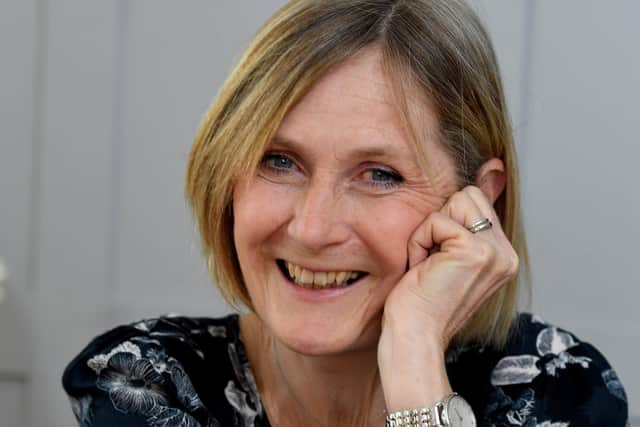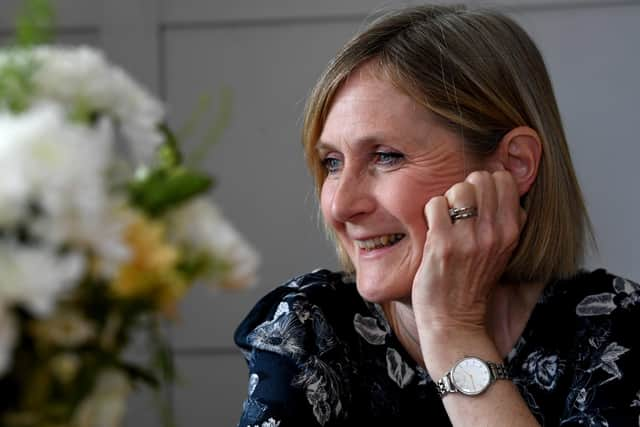Bruce Willis aphasia: Lancashire mum opens up on what life is like with brain condition
and live on Freeview channel 276
"I was shocked when I heard about Bruce Willis, it's awful news for him", said 53-year-old Bridget Sofield from Buckshaw Village.
"It's one thing for me to have it, but he's in an entirely different world, this is his job, he's so in the spotlight."
Advertisement
Hide AdAdvertisement
Hide AdBridget has been living with the condition for 12 years after surgery to remove an AVM -tangle of abnormal blood vessels in the brain – caused her to have a stroke.


From being an active and independent mum-of-three and with a career in social work, she was left partially-sighted, unable to speak, read or drive, suffered fits and had to give up the job she loved.
>>>Read more about how Headway has been boosted by National Lottery cash.
She can't remember much about the first two years after the stroke, and while speech therapy using baby books has helped her communicate, she still cannot read, write, forgets names, words and finds her thought process impaired.
She said: "I feel very different. My whole world changed in an instant and I was quite angry.


"I hated giving up my job because I loved it.”
Advertisement
Hide AdAdvertisement
Hide AdHer youngest daughter Emily, 20, said: "She gets frustrated when she's seen something and can't tell me what it is. She gets worked up about it and you realise how hard it is for her.
"We call it the guessing game, because we have to guess what she's trying to say."
Bridget said: "As hard as it is for me, it's also been hard for my husband Andrew and our three children. Emily was at primary school when all of this happened."


Law student Emily said: "I don't remember mum from beforehand, being 'normal', this is just how she is to me.
Advertisement
Hide AdAdvertisement
Hide Ad"I think my sister Alice found it hardest out of the children because she was 15 when it happened and she could remember what mum used to be like. At that age, when her friends were going out, doing things with their mum, she couldn't."
Emily says she finds it hard to explain her mums condition to new people she meets.
She said: "I don't like having to explain, and because you can't tell from the outside, sometimes it's nice not having to tell everyone.
"So when I heard about Bruce Willis, I thought how sad it was for him. But to hear he has the same condition as my mum has made me feel like we're in the same group now.
Advertisement
Hide AdAdvertisement
Hide Ad"It will make it easier to explain the condition mum has, and it will be nice to hear what he has to say."
Bridget said: "It's good he's speaking about it and not keeping it a secret. It will be interesting to see if he does interviews and if he raises awareness."
Everyday life
On a day-to-day basis Bridget fills her day with long walks of her dog, Tilly, does housework, and attends activities and meetings with Headway Central Lancashire.
Stating "I'd go mad if I couldn't go out", she tries to be as independent as possible and travels to Headway’s centre in Deepdale alone, but she finds it helpful to keep to set routines and to set journeys and finds large group situations difficult.
Advertisement
Hide AdAdvertisement
Hide AdShe said: "If there's a lot of people, I'll go quiet. You realise that in ordinary conversation, people talk quickly, and I can't keep up."
She carries a card in her purse explaining her condition, asking people to be considerate and often carries a white stick because of her sight problems.
While she says that most people are "lovely", there have been occasions where her condition has caused problems because people cannot tell she is disabled by her outward appearance.
She has also found that her circle of friends has shrunk since her diagnosis and worries about how she would cope if she had to live alone in the future.
Advertisement
Hide AdAdvertisement
Hide AdShe said: "In the beginning are are a lot of people helping and being kind. But after a while, it all calms down and your world becomes small.
"I've found my oldest friends from my school days are the ones I've kept in touch with most.
"If I was on my own it would be hard. I can't read, I can't work a computer.
"When you watch TV and they talk about the cost of living and there's figures, it means nothing to me, I don't understand it. I would need someone to explain it all."
Headway
Advertisement
Hide AdAdvertisement
Hide AdHeadway Central Lancashire supports adults who have suffered an acquired brain injury or a major trauma injury, their families and friends. They run a community rehabilitation activity programme, advice and information service and hospital visiting project.
Emily said: "Headway are amazing, they do all sorts of things. Soon after it happened, dad got in touch with them for support and they've been great.
"The difference it makes for her going to the meetings is massive, if she didn't have them we would have struggled more.”
Bridget added: "It gives me something to look forward to. I chat with people, we go on activities, and we're all different.
Advertisement
Hide AdAdvertisement
Hide Ad"There are other people there with aphasia and some people are younger than me and have a lot of trouble speaking. In a way, it makes me feel quite lucky that I can."
Liz Bamber, manager and founder member of Headway Central Lancashire said: ‘After a brain injury life can be very different for the person affected and it is important to get support in the early stages to understand how to manage the often-hidden disability and to get the right treatment and rehabilitation.
"It helps to meet others going through similar challenges, to share problems and coping strategies, and that is what we do at Headway through our community activity programme."
To contact Headway telephone 07557123493 or 01772 791460.
Email: [email protected]
Information about Aphasia
Injury to language centres of the brain leads to a condition called Aphasia and there are two main forms: receptive and expressive.
Receptive aphasia is an impairment of the understanding of language. People with receptive aphasia usually retain the ability to speak fluently, but the content of speech can be jumbled and often lack meaning.
Advertisement
Hide AdAdvertisement
Hide AdExpressive aphasia causes difficulty speaking and the person may have a limited vocabulary. Aphasia also effects a person’s ability to name objects such as a dog – replaced with ‘it is a pet - it barks’ and their ability to recognise letters or numbers, or write information down.
Tips for people supporting the person with Aphasia:
Avoid background noise during conversations.
Try to have plenty of time for a conversation.
Encourage the person to use nonverbal methods of communication such as pictures.
Agree signals or gestures for words you use often such as yes e.g. thumbs up for yes and thumbs down for no.
Do not pretend to understand if you do not.
Do not push the person for a level of accuracy that may not be achievable.
Do not judge the person or assume they do not understand as Aphasia does not affect intelligence, it simply is a problem with speaking and understanding language.